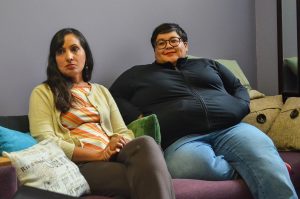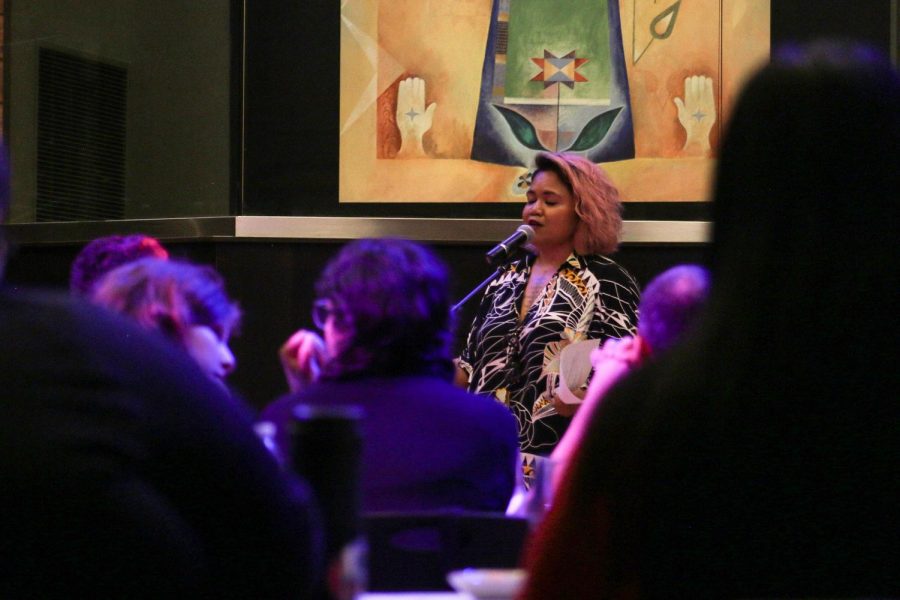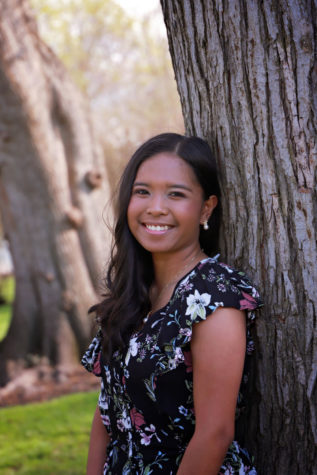Event celebrates Indigenous women
Poet, activist held poetry workshop; attendees invited to participate in open mic
TIMOTHY FAIRBANKS-CLOUSER | THE DAILY EVERGREEN
“Every opportunity to share my work is an intentional offering of myself,” says Terisa Siagatonu, touring poet, speaker and activist. The Honoring Indigenous Women event is a kick-off to Indigenous People’s Day on Oct. 14.
September 20, 2019
Terisa Siagatonu, touring poet, speaker and activist, was featured at WSU’s second annual Honoring Indigenous Women event on Sept. 18.
Siagatonu’s efforts focus on diverse issues like racial justice, LGBTQ+ rights, gender equity and climate change. Her efforts as a poet and activist in her Pacific Islander community led her to receive President Obama’s Champion of Change Award in 2012, according to her website. She was also a speaker during the 2015 United Nations Conference on Climate Change.
Women*s Center Director Amy Sharp said this annual event was inspired by visitors from American Samoa in September 2018. Various groups in the university wanted to honor their visit and provide an opportunity to engage diverse communities.
“We’re recognizing indigenous people as being still here and honoring indigenous women as being very resilient and [an] important part of the fabric of our community,” said Faith Price, director of Native American Student Services.
Price said the event was organized and funded by several groups including the Division of Student Affairs, the College of Education, the ASWSU Gender and Sexuality Alliance, the Women*s Center, the Native American Student Services and the School of Languages, Cultures, and Race.
Honoring Indigenous Women is a kick-off to Indigenous People’s Day on Oct. 14, she said.
“We’re not just celebrating our existence and celebrating those leaders and women of indigenous backgrounds, but we’re also asking the hard questions and figuring out together: what does that honor look like in real-time?” Siagatonu said.
The event commenced with Siagatonu’s meet-and-greet at the Asian American and Pacific Islander Student Center. Siagatonu said she was honored to be a guest because her college experience helped shape her identity.
She said it was during her freshman year at the University of California, Santa Cruz that she was exposed to spoken word poetry and wrote her first poem.
“So much of my identity was developed when I was in college,” Siagatonu said. “I believe so much of the movements that we see happening in our world come from young leaders who are just testing out their voices and their skills in real-time, especially on college campuses.”

Faith Price, left, Native American Services Director, and Amy Sharp, right, Director of the Women’s Center, discuss events honoring indigenous women on Wednesday morning at the Women’s Center in Wilson Short.
The event is Siagatonu’s first show of her 2019-20 tour, she said.
Siagatonu held a poetry workshop titled “Protecting the Sacred.” Attendees were given prompted discussions: what protection means to them, what they have protected in their lives and what they deem sacred. They engaged in freewriting to answer the prompts and used their notes to write what they think a world looks like when all is sacred.
Siagatonu also discussed in her workshop the activism efforts to protect Hawaii’s Mauna Kea volcano.
“We know that in the real world that when we stay quiet about things that matter, it only hurts us and it continues to harm the environment we exist in,” she said.
The event concluded with a poetry slam at the Elson S. Floyd Cultural Center. Graduate student Veronica Sandoval and MyKel Johnson, senior majoring in communication and society, opened the slam event with their poems. Siagatonu also shared her poems at the poetry slam.
Attendees were invited to participate during the open mic portion of the program. Siagatonu said everyone is in community and can voice their stories.
“I was really honored to share my perspective as an indigenous woman, especially from the tribe that’s territorial to here,” Johnson said. “To be able to speak my truth in a safe space was amazing.”
Siagatonu said she feels like no performance she gives is ever for the sake of performing.
“Every opportunity to share my work is an intentional offering of myself,” Siagatonu said.
The themes of the poems covered a myriad of topics like cultural identity, home and displacement, diversity, assimilation, violence, inequality and hope.
Sharp said they are planning to continue to celebrate these events annually and get more people involved.
“I’m looking forward to growing this event and exposing as many students and faculty and staff as possible to our indigenous people here, our heritage, and the great things people do in modern times,” Price said. “A lot of times, native people are relegated to history; that’s the only time we talk about them.”











